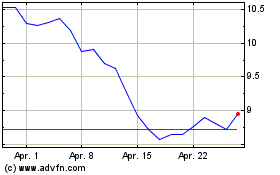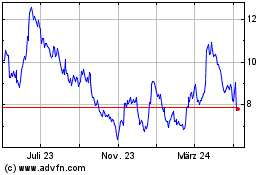BRASKEM - In 2020, the Recurring Operating Result was US$2,082 million, 38% higher than 2019
11 März 2021 - 5:15AM
PR Newswire (US)
SÃO PAULO, March 10, 2021
/PRNewswire/ -- BRASKEM S.A. (B3: BRKM3, BRKM5 and
BRKM6; NYSE: BAK; LATIBEX: XBRK) announces today its results for
4Q20 and 2020.
4Q20 HIGHLIGHTS:
Braskem - Consolidated:
- The Company's recurring Operating Result was US$833 million, 22% higher than in 3Q20,
explained mainly by better spreads for resins and main chemicals in
Brazil, for PP in the United States and for PE in Mexico. Compared to 4Q19, recurring Operating
Result in U.S. dollar was 246% higher, due to: (i) the better
spreads for resins and main chemicals in Brazil, for PP in the United States and Europe and for PE in Mexico; and (ii) the higher sales volume of
resins and main chemicals in Brazil. In Brazilian real, the recurring
Operational Result was R$4,522
million, 23% and 355% higher than in 3Q20 and 4Q19,
respectively, due to the depreciation in the Brazilian real against
the U.S. dollar.
- In 2020, the Company recorded a net loss1 of
R$6,692 million, explained mainly by
the provisions related to the geological event in Alagoas in the
amount of R$6,902 million and by the
impact of the exchange variation on the financial result given the
Brazilian real depreciation against the U.S. dollar on net exposure
of US$3,400 million.
- In the year, the Company registered positive net cash
generation of R$1,276 million, mainly
due to: (i) strong operating result; (ii) the monetization of
PIS/COFINS credits of R$1,786
million; and (iii) the reduction of the Company's projected
investments by 23%. These impacts were partially offset by the
impact from working capital on cash flow in the first half of the
year, given the cash consumption caused by the change in the
feedstock profile, with lower volumes of imported naphtha.
- Supported by the Company's cash generation and continued
commitment to its financial health, corporate leverage measured by
the ratio of Net Debt to recurring Operating Result2 in
U.S. dollar was 2.94x.
- In the year, the overall accident frequency rate with and
without lost time (CAF + SAF) was 0.95 event per million hours
worked, 71% below the industry average3. The rate is the
lowest rate of the last three years and was achieved with the
efforts and training under the Company's Human Reliability Program.
Also, the Company achieved the best historical results in process
safety with a Tier 1 accident frequency rate of 0.07 Tier 1/million
hours.
- In December 2020, the Company
concluded an important advance relating to the geological event in
Alagoas and its potential impacts by entering into agreements for
Compensation of Residents and for Socio-Environmental Reparations
(jointly referred to as "Agreements"). After approval of the
Agreements by the competent authorities, the Public-Interest Civil
Actions filed against Braskem relating to the compensation of
residents and social and environmental reparations arising from the
geological event in Alagoas were dismissed.
- In December 2020, Braskem
concluded the renewal of its feedstock supply agreements for its
petrochemical plants with Petrobras by executing contracts for the
supply of petrochemical naphtha to its industrial unit in São Paulo
and for ethane and propane to its industrial unit in Rio de Janeiro. The purpose of the contracts,
with duration of around 5 years after the end of the current
contracts in December 2020, is to
supply annual volumes of up to 2 million tons of petrochemical
naphtha to São Paulo and of up to 580,000 tons of ethylene
equivalent (ethylene volume for each ton of ethane and propane) to
Rio de Janeiro, with prices based
on international references.
- In February 2021, the Company
announced the resumption of chlor-alkali production and
dichloroethane in its unit located in the Pontal da Barra district
of Maceió, Alagoas, which had been shut down since May 2019. To restart the Chlor-Alkali Plant,
Braskem concluded the project to produce brine as feedstock made
from imported salt, which allowed it to resume production of PVC
and caustic soda with an integrated model.
- In the quarter, recycled products sales reached 5.7 kton, up
310% from 3Q20, reflecting the stronger demand in Mexico and the start of recycled resins
commercialization in Europe.
- In the year, the utilization rate of green ethylene was 87%, an
increase of 9 p.p. in relation to 2019, and Green PE sales achieved
170 kton, higher 5% in relation to the previous year, being both
amounts historical records since the beginning of Company's
biopolymers operations in 2010.
Brazil:
- The recurring Operating Result in Brazil was US$680
million (R$3,684 million), 29%
higher than 3Q20, mainly due to the higher spreads in the
international market for PE, PP, PVC and main chemicals, accounting
for 79% of the Company's consolidated recurring Operating
Result.
- In 4Q20, in line with its strategy of prioritizing serving the
Brazilian market, the Company registered resin sales volume in the
domestic market of over 1,0 million tons, which is approximately
17% higher than its historical average4.
United States and
Europe:
- The recurring Operating Result in the
United States and Europe
was US$117 million (R$626 million), 12% lower than in 3Q20, mainly
due to the lower products supply in both regions, and accounting
for 13% of the Company's consolidated recurring Operating Result.
In relation to 4Q19, the 87% increase is basically explained by
better PP spreads in the United
States and Europe.
- In the quarter, the ramp-up process of the new PP plant in
the United States (Delta) improved
significantly in terms of both production volume and quality of the
material produced. The new plant's production was 101 ktons,
representing approximately 90% of utilization rate, considering the
quarterly production capacity of around 113 ktons.
Mexico:
- The recurring Operating Result in Mexico was US$63
million (R$350 million), 20%
lower than 3Q20 and 18% lower than 4Q19. Mexico's recurring Operating Result accounted
for 8% of consolidated the Company's consolidated recurring
Operating Result.
- In the quarter, Braskem Idesa imported approximately 35,000
tons (average of 7,000 barrels per day) of ethane from the United States to complement the ethane
supplied by Pemex, which represented 9% of the PE utilization rate
of the Petrochemical Complex in Mexico, whose utilization rate stood at 48% in
the quarter. In December 2020,
Braskem Idesa completed an expansion of the Fast Track operation,
which currently has an expected capacity of 20 thousand barrels per
day of ethane, or about 30% of the total ethane requirement of the
petrochemical complex.
- In December 2020, the subsidiary
Braskem Idesa was notified by the Centro Nacional de Control del
Gas Natural ("Cenagas"), the Mexican government agency responsible
for the natural gas pipeline and transportation system in the
region, regarding the unilateral suspension of natural gas
transportation, an energy input essential for the production of
polyethylene at the Petrochemical Complex in Mexico. As a result, and respecting the safety
protocols, Braskem Idesa immediately suspended its operations.
- On January 7, 2021, the Company
announced the partial resumption of polyethylene production by
Braskem Idesa based on an experimental business model that follows
all safety protocols and reduces the impacts on serving the demand
from Mexico's plastics
industry.
- According to Notice to the Market of March 1, 2021, Braskem Idesa signed with PEMEX
and Cenagas the following documents to enable BI continued
operation:
-
-
- i. a memorandum of understanding ("MoU") with
PEMEX setting out respective understandings for the discussion of
potential amendments to the Ethane Supply Contract and for the
development of an ethane import terminal, subject to negotiation,
entering into definitive documentation, approvals of BI's
shareholders and creditors and with reservations of rights;
and
- ii. an agreement for natural gas transport service
with CENAGAS, with a term of 15 years, such term conditioned upon
the execution of the definitive documentation referenced in item
(i) above.
- With the execution of these documents by BI, BI commenced to
receive the service of natural gas transportation, which had been
unilaterally terminated in December
2020, allowing the Company to use natural gas in its
production process and electricity generation. Additionally, the
existing Ethane Supply Contact between BI and PEMEX has not been
modified. At the time, BI cannot predict the outcome of such
discussions with PEMEX, its shareholders and creditors.
The full earnings release is available on the Company's IR
website: www.braskem-ri.com.br/home-en
Braskem will host conference calls to discuss its Results
THURSDAY, March 11 at 09:00 a.m. US ET.
Additional information may be obtained from the Investor
Relations Department at +55 11 3576-9531 or
braskem-ri@braskem.com.br.
1Based on net loss attributable to the Company's
shareholders.
2Excludes the Project Finance in Mexico and based on recurring EBITDA.
3 The industry average is 3.25 per million hours
worked according to the American Chemistry Council. The most
recent data refers to 2018.
4Considering the historical average since 1Q10.
 View original
content:http://www.prnewswire.com/news-releases/braskem---in-2020--the-recurring-operating-result-was-us2-082-million-38-higher-than-2019--301245186.html
View original
content:http://www.prnewswire.com/news-releases/braskem---in-2020--the-recurring-operating-result-was-us2-082-million-38-higher-than-2019--301245186.html
SOURCE Braskem S.A.

Copyright 2021 PR Newswire
Braskem (NYSE:BAK)
Historical Stock Chart
Von Dez 2024 bis Jan 2025

Braskem (NYSE:BAK)
Historical Stock Chart
Von Jan 2024 bis Jan 2025
